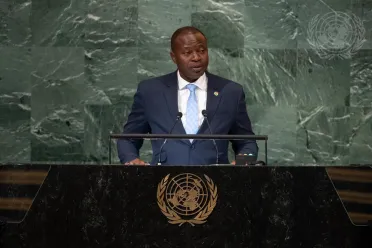Statement
Statement summary
PAUL HENRI SANDAOGO DAMIBA, President of Burkina Faso, Head of State and President of the Council of Ministers of Burkina Faso, pointed out that for some time now there has been a resurgence of nationalism and an inward-looking approach across the globe, a reversal of liberty and democracy, and a will on the part of some countries to impose their vision of the world. “Members of the international community are talking about their great vision of an unipolar, single coloured world, in line with their ideology and their interests,” he stressed, urging the international community to stand up to this and ensure the spirit of solidarity. Member States must move beyond individual interests, which often lead to crises, he added, calling on all in the international community, no matter their political, economic or military power, to join in that movement. To resolve the questions that have been returning to the Assembly’s agenda for several years — the questions of Palestine, Western Sahara, debt, climate change, the embargo against Cuba, and Security Council reform, as well as the war in Ukraine — Member States must ensure the preeminence of the rule of law, justice and equity, and the triumph of common sense.
Turning to the situation in his country, he said that on 24 January, a group of “young patriots had to assume their responsibilities in the public management of State affairs […] by setting up a democratically elected but chaotic regime”. He underscored that: “While the movement of 24 January is illegal in absolute terms, and perhaps reprehensible in terms of the principles held dear to the United Nations and the international community, we do believe that this interruption of the constitutional order, given the prevailing situation, was necessary and indispensable.” “It was above all an issue of survival for our nation,” he stressed, pointing out that the movement was met with enthusiasm and public support, which still prevails for the transitional authorities that he has been leading for eight months. The recent events that have caused upheaval in its democratic process are due to a lack of response to the security crisis and “disastrous” political governance.
He went on to say that such lack of response has led to 1,520,012 displaced people by 31 August — the greatest number of internally displaced persons in the political history of the country and the subregion. It has also led to a humanitarian and food crisis unprecedented in its history; the closure of several thousand schools and half a million students deprived of education; and an economic abyss caused by the slowdown or halting of several economic activities, such as mining, tourism, agriculture and transport, he added. Those difficulties are part of a subregional security context that is affected by attacks by numerous terrorist groups operating in the Sahel, particularly in the Central Sahel, which includes Burkina Faso, Mali and Niger. To tackle this problem, the Transitional Government has established a plan of action based on four strategic objectives: combating terrorism and restoring the integrity of the territory; responding to the humanitarian crisis; restructuring of the State and improving governance; and national reconciliation and social cohesion.
However, his country needs the international community’s support to produce lasting effects in the fight against terrorism, especially because Burkina Faso’s geographic position makes it a linchpin for the expansion of terrorism towards coastal countries such as Benin, Côte d'Ivoire, Ghana and Togo, he continued. The stability, security and peace of the Sahel are not just a matter for the countries of this region, but a problem which imperils international peace and security, given the migration of the phenomenon of terrorism from the north to the south of the continent. Given the reality on the ground, efforts made so far fall below expectations, he said, welcoming the joint strategic evaluation mission between the African Union and the United Nations on security in the Sahel. He called on partners to support the transitional action plan adopted on 6 May, to close the gap of approximately $4.5 billion out of a total budget of just over $18 billion. The transitional authorities in his country will not evade their responsibilities to the Burkinabé people and their duties to the international community, he stressed.
In that regard, he said that the transitional authorities reached a commitment with the Economic Community of West African States (ECOWAS) regarding a timeline for the transition, set at 24 months beginning from 1 July and the need to set up a monitoring and evaluation mechanism for the transition based on security indicators, as well as the return of State services to occupied areas and the return of displaced persons. Significant progress in those areas will allow for favorable conditions for holding credible and transparent elections with a view to return to normal constitutional order. He thanked all partners for their support and called on others who have not yet done so to support his country’s reconstruction. Turning back to the Sahel, he warned that: “If nothing is done to come to the aid of the countries of this region decisively and urgently, we run the risk of a resurgence of terrorism in the countries of the Gulf of Guinea and then in the rest of the world, starting in Europe, the continent closest to Africa.” He called for solidarity, as well as assistance, which allows them to move away from aid, and that is in line with their convictions and respects their dignity.
Full statement
Read the full statement, in PDF format.
Photo

Previous sessions
Access the statements from previous sessions.
